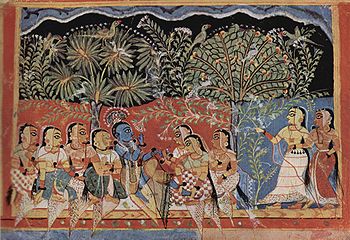- Gīta Govinda
-
Gīta Govinda
El Guitá Govinda es un texto escrito por el poeta orisano Yaiá Deva (siglo XII).
- गीतगोविन्द, en escritura devánagari.
- gītagovinda, en el sistema IAST de transliteración sánscrita.
- Pronunciación: guitá govinda.[1]
- Etimología: ‘Govinda cantado’, o Govinda (‘que da placer a las vacas’, el dios pastor Krishná) alabado mediante una canción.
Este poema erótico mistico describe la relación entre el dios pastor Krishná y las gopís (cuidadoras de vacas) en Vrindavan, y en particular una gopí llamada Radha (que supuestamente representa al alma humana). Esta obra tuvo una gran importancia en el desarrollo de las tradiciones bhakti (devoción) del hinduismo.
El Guitá Govinda está organizado en 12 capítulos. Cada capítulo está subdividido en 24 prabandha. Estos a su vez contienen estrofas organizadas en grupos de ocho, llamadas ashta padis.
El sanscritólogo británico William Jones publicó la primera traducción al inglés en 1792, donde Kalinga (la antigua Orissa) se indica como el país de origen del texto. Desde entonces, el Guitá Govinda ha sido traducido a muchos idiomas de todo el mundo, y se considera uno de los ejemplos más finos de la poesía sánscrita.
Notas
- ↑ Según el Sanskrit-English Dictionary del británico Monier Monier-Williams (1819-1899).
Enlaces externos
 Wikimedia Commons alberga contenido multimedia sobre Gīta Govinda.
Wikimedia Commons alberga contenido multimedia sobre Gīta Govinda.
 Wikisource contiene obras originales de o sobre Gīta Govinda.
Wikisource contiene obras originales de o sobre Gīta Govinda.- ignca.nic.in (presentación multimedia del Guitá Govinda).
- Odia.org (versión oriya del Guitá Govinda).
Categorías: Poesía | Literatura erótica | Literatura medieval | Literatura hindú | Literatura de la India | Literatura en sánscrito | Libros sagrados
Wikimedia foundation. 2010.

